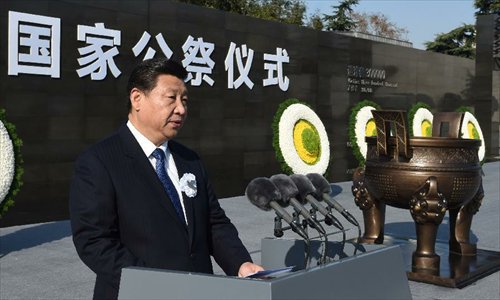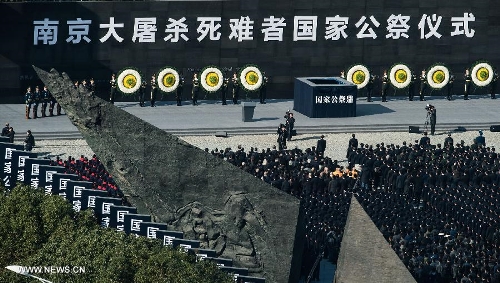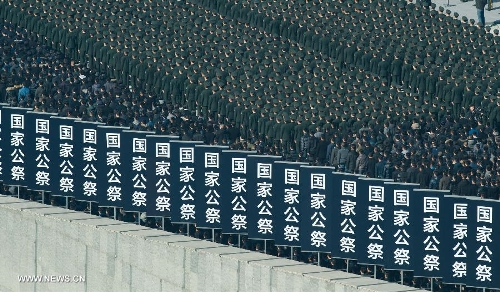President Xi attends China's first state memorial ceremony for Nanjing Massacre victims

Chinese President Xi Jinping addresses a state commemoration for China's first National Memorial Day for Nanjing Massacre Victims in Nanjing, east China's Jiangsu Province, December 13, 2014. Photo:Xinhua

The state ceremony for China's first National Memorial Day for Nanjing Massacre Victims is held at the memorial hall for the massacre victims in Nanjing, capital city of east China's Jiangsu Province, Dec. 13, 2014. (Xinhua/Li Xiang)

The state ceremony for China's first National Memorial Day for Nanjing Massacre Victims is held at the memorial hall for the massacre victims in Nanjing, capital city of east China's Jiangsu Province, Dec. 13, 2014. (Xinhua/Han Yuqing)
Chinese President Xi Jinping said Saturday that denial of the Nanjing Massacre will not be allowed by the Chinese people or peace-loving people anywhere in the world.
The Nanjing Massacre, committed by Japanese aggressors, was one of three major massacres during WWII. It was an atrocious anti-human crime and a dark page in the history of humanity, Xi said while addressing a state commemoration for China's first National Memorial Day for Nanjing Massacre Victims.
"Anyone who tries to deny the massacre will not be allowed by history, the souls of the 300,000 deceased victims, the 1.3 billion Chinese people, and all people who love peace and justice in the world," Xi said.
The ceremony, presided over by Zhang Dejiang, chairman of the Standing Committee of the National People's Congress (NPC), was held at the memorial hall for the massacre victims in the east China city of Nanjing.
Japanese troops captured Nanjing, then China's capital, on Dec. 13 of 1937 and started a 40-odd-day slaughter. More than 300,000 Chinese soldiers, who had laid down their arms, and civilians were murdered and about 20,000 women were raped.
The memorial ceremony started at 10 a.m. A total of 10,000 representatives of all walks of life present at the ceremony paid silent tribute for one minute to the massacre victims as sirens howled over the city.
Sixteen honor guards laid eight wreaths in memory of the victims while the national flag flew at half-mast to mourn the victims. Seventy-seven students read the declaration of peace.
Xi, along with Xia Shuqin, an 85-year-old massacre survivor, and a school child, unveiled a memorial "ding," a type of ancient Chinese cauldron symbolizing state power and prosperity, during the ceremony. The three-legged bronze ding will be permanently placed at the square of the hall.
Xi, who wore a white flower on his lapel, said the ceremony was held to commemorate innocent victims in the massacre, compatriots killed by Japanese aggressors, as well as revolutionary martyrs and heroes who devoted their lives to victory in the war against Japanese aggression.
"The purpose of the memorial ceremony for Nanjing Massacre victims is to recall that every good-hearted person yearns for and holds a firm stance of peace, but does not try to prolong hatred," Xi said.
"Only if everyone cherishes and safeguards peace, and only if everyone remembers the bitter lessons of war can there be hope for peace," he said.
The Chinese and Japanese people should live in friendship from generation to generation and make joint efforts to contribute to the peace of humanity, he said.
"We should not bear hatred against an entire nation just because a small minority of militarists launched aggressive wars. The responsibility for war crimes lies with a few militarists, but not the people. However, we cannot at any time forget the severe crimes committed by aggressors," he said.
People who love peace and justice must remain highly cautious and firmly oppose words and actions that glorify war, he added.
In his speech, Xi expressed thanks to the foreigners who protected Nanjing residents and recorded the atrocities of the Japanese invaders, despite the risks.
German businessman John Rabe, Bernhard Arp Sindberg from Denmark, and US priest John Magee were among the foreign friends.
"The Chinese people will never forget their humanitarian spirit and brave and righteous acts," Xi said.
Xi also noted that today's China has become a great country capable of guaranteeing a peaceful life for the people. The time has gone when the Chinese nation was bullied and humiliated by other countries.
The Chinese people will also declare to the international community that today's China is a firm advocate and strong defender of world peace, Xi said.
In February 2014, China's top legislature designated Dec. 13 as the National Memorial Day for Nanjing Massacre Victims to mourn those killed by Japanese invaders and expose war crimes committed by the Japanese.
According to the decision passed by the NPC Standing Committee, the move was aimed at remembering the calamities the war caused the Chinese people and people around the world and conveying the Chinese people's firm stance against aggression and in favor of human dignity and world peace.
After Xi finished speaking, six representatives struck the Bell of Peace and 3,000 doves signifying peace flew over the memorial hall.
More than 200 journalists, including those from China, Japan, South Korea, the United States and Russia, reported on Saturday's event.
It is the third time this year President Xi has attended high-level activities related to Japanese aggression toward China.
He attended a ceremony on July 7 to mark the start of the War of Resistance Against Japanese Aggression in 1937, as well as a victory day celebration on Sept. 3 for the 69th anniversary of the victory against Japanese aggression.
On the Sept. 3 victory day, Xi criticized some Japanese political organizations and politicians who have challenged human conscience by denying the crimes, paying homage to the spirits of war criminals, and glorifying aggression and colonial rule.
China has never blamed the Japanese people for the war, but China demands the Japanese government and politicians show a minimum of respect to the people of neighboring countries and acknowledge the millions of victims in the war, he noted.
Japan invaded northeast China in September 1931, followed by a full-scale invasion that started on July 7, 1937. Around 35 million Chinese soldiers and civilians were killed or injured during the Japanese occupation, which continued until 1945.